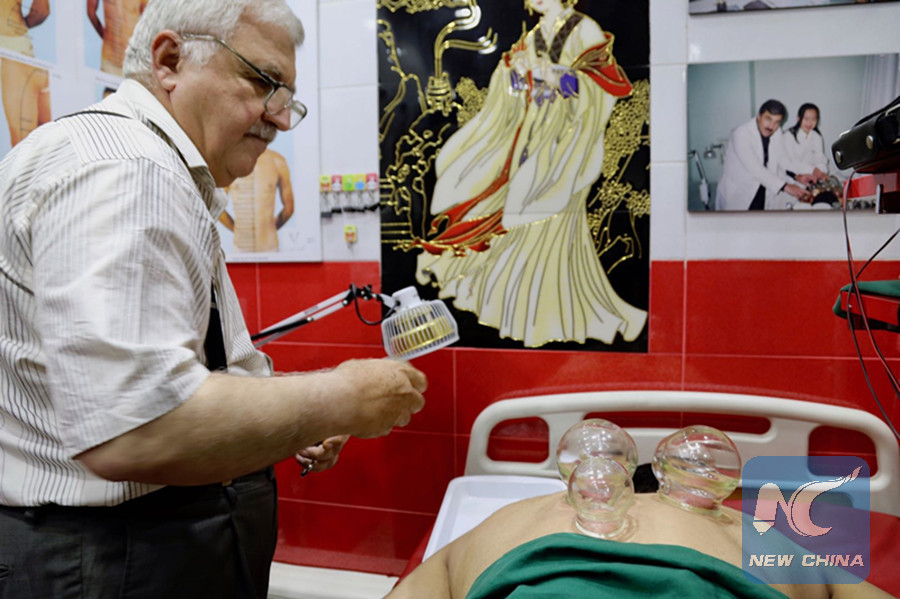
Iraqi physician Sabah al-Mustwfi is using cupping therapy for treatment in his clinic in Baghdad on June 14, 2018. (Xinhua)
BAGHDAD, June 27 (Xinhua) -- In a two-storey building with stylish facade at a calm side street in Baghdad's Karrada neighborhood, Sabah al-Mustwfi received his patients who resorted to traditional Chinese medicine after giving up modern Western medicine due to the complications and high cost.
Mustwfi opened his private clinic 20 years ago and has moved to different areas in Baghdad until settling here recently.
His services range from simple remedies for muscle pain to treatment for more serious and intractable diseases, such as migraines, sciatica, joints chronic pain, obesity and addiction to smoking.
Mustwfi is a physician who graduated from Baghdad College of Medicine and practiced the Western medicine for a long time until early 1990s, when Iraq was under severe UN sanctions after the former Iraqi leader Saddam Hussein occupied neighboring Kuwait.
"The severe UN sanction on Iraq, forced the then Iraqi Ministry of Health to find alternative methods to overcome medicine scarcity. One of them was the traditional Chinese medicine," said Mustwfi, one of those doctors chosen to be sent to China to learn Chinese medicine.
After receiving training in China, Mustwfi began to practice what he learned in the conflict-torn country, and was also nominated by the Iraqi Health Ministry to set up courses of traditional Chinese medicine training in Baghdad for other Iraqi doctors.
In 2003, Iraq has been engulfed with chaos, insecurity and what is known as "Iraqi brain drain," as hundreds of Iraqi doctors, professors and teachers were kidnapped, murdered or forced to leave the country in what some see as a deliberate campaign.
Meanwhile, Iraq has witnessed some of the worst attacks against healthcare professionals since 2003, as Iraqi doctors were assaulted, violated and humiliated.
After years of his active role in practicing traditional Chinese medicine, training local doctors and guiding awareness campaigns by writing articles and attending regular TV programs, Mustwfi had to keep low profile after the 2003 U.S.-led invasion.
"I don't accept interviews with Iraqi or foreign media despite many attempts by them, because in such a fragile situation, you can't predict what will happen next hour," Mustwfi told Xinhua.
According to the Red Cross, over half of country's doctors have fled abroad. The mass exodus of Iraqi doctors has very negative impact on the healthcare system here, which used to be considered one of the best systems in the Middle East region in 1970s and 1980s.
In such atmosphere, it is hard for Mustwfi, like many other doctors, to practice his work, in the devastated healthcare system.
"Because of the circumstances of Iraq (sanctions before 2003, and chaos and insecurity after 2003), the Chinese medicine could not be promoted in the country. But for me, I have my own patients who are educated and have knowledge about acupuncture treatment and other methods of traditional Chinese medicine," Mustwfi said.
"Here in Baghdad, there is a fine line between medicine and imposture. I know (as a physician) that many diseases cannot be treated by Chinese medicine, sometimes we need surgical intervention or some modern medical devices," he said.
"However, we need the traditional Chinese medicine in many cases, where the Western medicine had failed to treat. A large number of patients that I receive in my clinic are those who suffer intractable diseases," he added.
In his clinic, Mustwfi carefully inserted hair-thin needles into the back of one of his patients, while explaining that inserting the needles are painless and that this treatment will alleviate the pain of his muscle and maintain balance in his body.
Outside the consulting room, an old man and two women were waiting to be treated by the doctor.
Finally, like any other aspect of life, Iraq needs more stability and more improvement in security, to give a push forward to healthcare workers, including traditional Chinese medicine practitioners. Otherwise, the deterioration in health situation in Iraq will continue, said Mustwfi.

